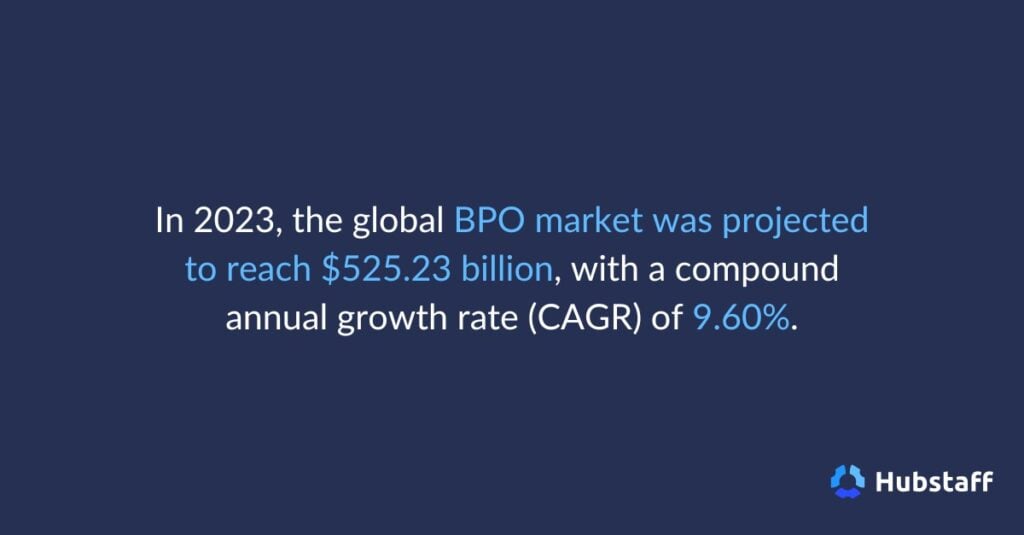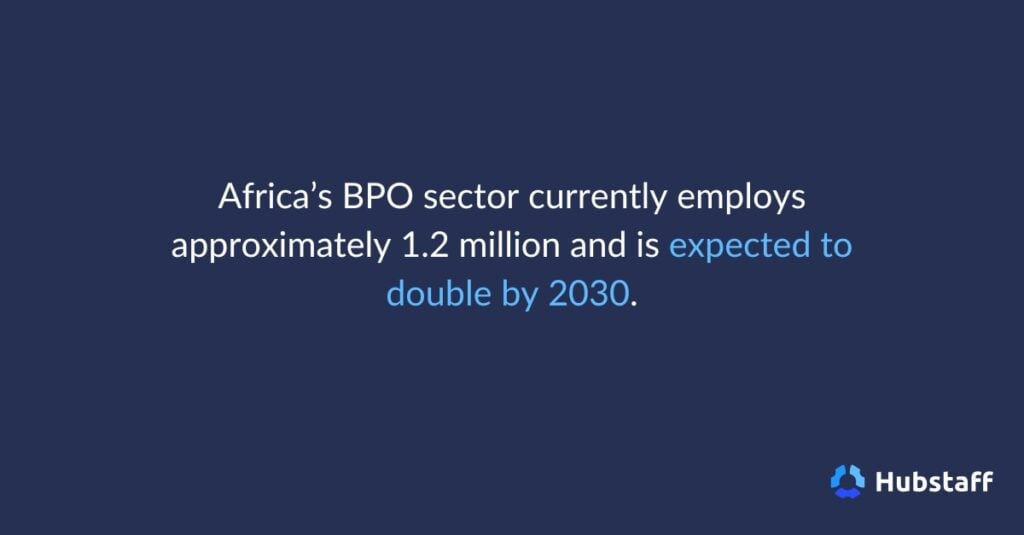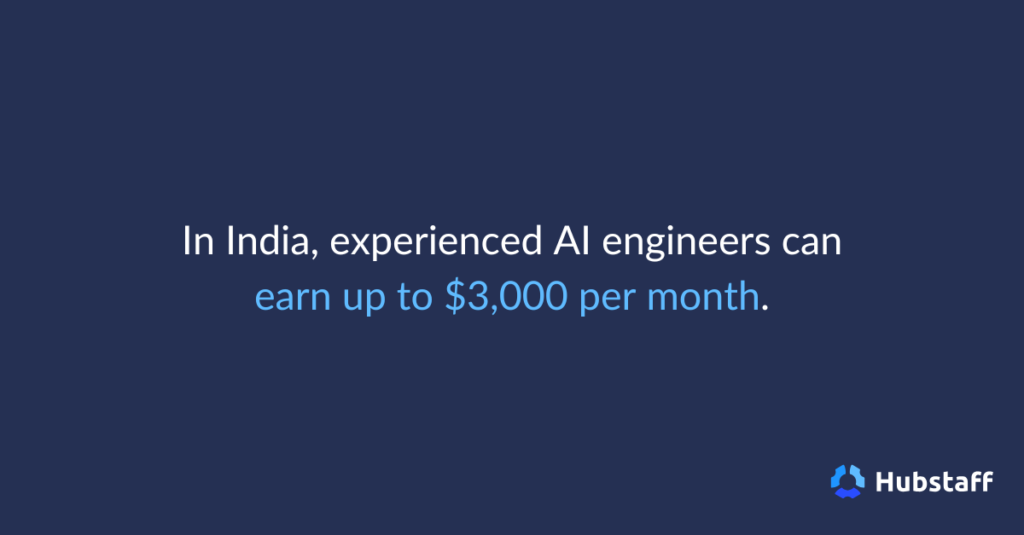Where BPO Giants Hire and How They Pay: Top Hiring Hubs for BPOs
Contrary to popular belief, BPO companies are more than a loophole for cheap labor. That’s why we’re exploring the top hiring hubs for BPOs.
BPOs serve as the foundation for hundreds (if not thousands) of strategic and scalable global teams. A BPO (Business Process Outsourcing) company can help businesses cut costs and boost efficiency — but only if they hire right.
In this guide, we’ll uncover where leading providers are hiring and what they’re paying and explore the role business process outsourcing plays in modern workforce trends.
Let’s get started.
Boost your team’s efficiency with Hubstaff's productivity tools
The evolving BPO hiring landscape
During the early 2000s, business process outsourcing was primarily seen as a cost-cutting measure. The idea was to outsource time-consuming tasks that didn’t require highly niche expertise to external providers.
It’s much different today.
The global BPO market was projected to reach $525.23 billion in 2023, with a compound annual growth rate (CAGR) of 9.60%.
Nowadays, BPOs are more synonymous with expansion than cost reduction.
Outsourcing services have become integral to many companies’ growth and hiring strategies, as they provide access to specialized expertise in functions like:
- Software Development
- Customer Support
- Technical Support
- Digital Marketing
- Business Operations
- Business Development
- Human Resources (HR)
Here’s the real question: where do you find skilled and cost-effective talent?

The powerhouses: Top hiring hubs for BPOs
1. The Philippines – The call center capital
The Philippines stands as the world’s call center capital — a title earned through its unique blend of linguistic proficiency and cultural compatibility with the West.
In fact, in the 2024 EF English Proficiency Index (EF EPI), the Philippines ranked 22nd globally and second in Asia.
Why they’re a leader
The country’s cultural affinity with Western nations makes it easier for local professionals to build rapport with customers, which is crucial in customer care services.
In addition, the Philippine government’s support (through remote work incentives and infrastructure development) has created a business-friendly environment for BPO companies.
Best for
The Philippines has some of the best BPO service providers in the world, excelling in:
- Customer support
- Technical assistance
- Telemarketing
The Filipino workforce’s strong communication skills also make it ideal for roles that require direct interaction with primarily English-speaking clients.
Pay band
Entry-level customer service representatives typically earn between $400 and $600 per month, depending on experience and specific job requirements.
2. India – The tech and back-office giant
India has dominated the outsourcing landscape for decades with its excellent contact center services and back-office operations.
The country’s strength lies in its massive, highly educated workforce that delivers excellent technical support services to clients worldwide. Thanks to its well-established IT ecosystem, India remains the go-to destination for companies outsourcing complex technical business functions.
Why they’re a leader
India produces millions of graduates each year, particularly in engineering and IT. This results in a very deep talent pool for outsourcing.
Combining India’s strong English-speaking workforce with decades of BPO experience will make you one of the most sophisticated and well-equipped outsourcing markets worldwide.
Best for
India is ideal for:
- Contact center services
- IT support
- Software development
Companies looking for scalable and high-quality outsourcing solutions turn to India for its workforce’s technical excellence.
Pay band
Entry-level technical support professionals in India typically earn between $300 to $700 per month.
As employees gain experience, salaries for roles like senior-level IT and technical support may exceed $1,200 per month.
3. Latin America – The rising nearshore alternative
Thanks to its unique advantages of geographic proximity and bilingual talent, Latin America has emerged as a compelling nearshore destination in the BPO industry.
Why they’re a leader
Companies in the U.S. and Canada benefit from real-time collaboration, as Latin American time zones align closely with their business hours.
The region also boasts a large pool of bilingual professionals — for instance, Puerto Rico considers Spanish and English official languages.
This makes it an ideal choice for customer support and technical assistance, as these are the most popular languages in the U.S.
Best for
Latin American professionals excel in:
- English/Spanish customer service and call center operations
- Sales and lead generation
- Finance and back-office support
Latin America’s BPO solutions are hard to beat if you need cost-effective outsourcing and real-time collaboration.
Pay band
Salaries in Latin America’s BPO sector vary by country and role.
| Role | Mexico | Colombia | Argentina |
| Call center representative | $700 to $4,200/month | $450 to $1,800/month | $100 to $200/month |
| Software developer | $1,800 to $4,500/month | $800 to $1,900/month | $1,000 to $2,100/month |
| Financial analyst | $1,000 to $2,000/month | $800 to $1,400/month | $100 to $300/month |
4. Eastern Europe – The premium BPO market
Eastern Europe has carved out a niche as a high-quality outsourcing hub, balancing cost-effectiveness and specialized expertise.
Companies in this region focus on business process management and IT outsourcing, making them ideal partners for businesses that require technical excellence and innovation.
Why they’re a leader
Eastern Europe has a highly skilled workforce with strong IT, software development, and data analytics expertise.
Countries in this region have world-class technical universities that produce thousands of engineers yearly, making the region a prime choice for outsourcing business processes that require more than basic operational support.
Unlike many offshore outsourcing locations, Eastern Europe offers a strong cultural and business alignment with Western Europe and North America. This means fewer communication barriers and a smoother integration of outsourced teams into existing business process outsourcing services.
Best for
Eastern European professionals are known to be highly skilled in:
- Software Development
- Data Analytics
- Cybersecurity
- Cloud Solutions and Infrastructure
The above and Eastern Europe’s fit with Western business standards make the region a great choice for high-value outsourcing.
Pay band
Salaries in Eastern Europe’s BPO sector vary by role, experience level, and country.
| Role | Ukraine | Poland | Romania |
| Software developer | $2,000 to $5,000/month | $2,600 to $4,500/month | $1,600 to $3,100/month |
| Data analyst | $700 to $1,400/month | $1,600 to $2,900/month | $900 to $1,800/month |
| Cybersecurity engineer | $600 to $1,100/month | $1,600 to $3,200/month | $1,100 to $2,900/month |
5. Africa – The emerging contender
Africa is rapidly positioning itself as a formidable player in the global BPO landscape with a multilingual workforce and rapidly improving technological infrastructure.
The continent’s BPO sector currently employs approximately 1.2 million individuals across over 400 contact centers, and projections indicate that this workforce could double by 2030.

Why they’re a leader
Several African nations have established themselves as leading providers of various BPO functions. For example:
- South Africa is recognized as one of the world’s top offshore customer experience delivery locations.
- Egypt has BPO providers specializing in call center operations and IT services to bridge the gap in Europe, the Middle East, and the U.S.
Best for
African BPO providers excel in:
- Customer service and call center operations
- Multilingual support
- IT and technical support
Pay band
Salary ranges in Africa’s BPO sector vary by country and role:
- Customer support: In countries like Kenya, entry-level customer service representatives earn between $200 to $500 per month.
- Technical support: In South Africa, technical support roles command salaries ranging from $400 to $1,400 per month.
- Multilingual agents: In Morocco, agents providing services in languages such as French and Spanish can expect monthly salaries between $1,000 and $3,000.
Pay bands across regions: What BPOs are paying
Comparing salaries across regions is difficult because factors like cost of living, expertise levels, and job scopes vary greatly.
However, here’s a breakdown of average salaries in the BPO center of each region to give you an idea.
| Region | Customer support | Tech support | Software developer |
| Philippines | $400 to $600/month | $400 to $800/month | $600 to $1,500/month |
| India | $200 to $300/month | $300 to $600/month | $400 to $900/month |
| Latin America (Mexico) | $700 to $1,200/month | $1,000 to $2,100/month | $1,100 to $2,700/month |
| Eastern Europe (Poland) | $1,100 to $1,900/month | $1,300 to $4,000/month | $2,700 to $4,500/month |
| Africa (South Africa) | $400 to $1,500/month | $600 to $1,300/month | $1,500 to $3,000/month |
Factors that affect wages
Salaries in BPO businesses worldwide shift based on economic conditions, market demand, and financial stability.
Three major factors shape wage fluctuations across regions: inflation, currency fluctuations, and demand for talent.
Inflation
Inflation directly impacts wages by eroding purchasing power.
In high-inflation economies like Argentina and Turkey, BPO companies must frequently adjust salaries to keep pace with rising living costs.
On the other hand, low-inflation economies like Poland or Mexico offer more stable salary structures that make them more predictable for long-term outsourcing contracts. For example:
- In Argentina, inflation surpassed 200% in 2023, forcing businesses to increase wages to maintain the same real income levels.
- In contrast, India’s inflation rate has remained below 5%, making salary adjustments smaller and more predictable.
Currency fluctuations
Exchange rates play a huge role in how attractive a country is for outsourcing.
When a local currency weakens against the U.S. dollar or Euro, labor becomes cheaper for foreign companies. However, it can be challenging for workers facing rising import costs.
Here are some examples:
- Africa’s ZAR is famously volatile against the USD. However, this sometimes makes outsourcing to the region significantly cheaper for US and European clients.
- Poland’s PLN remains relatively stable in Eastern Europe, making it safer for long-term BPO contracts.
- The Philippines’ weaker PHP benefits BPO firms, which allows clients to build entire customer support teams based in the country.
Skill demand
The more in-demand a skill set is, the higher the salaries are.
Basic customer support roles remain relatively stable in pay, but high-demand fields like AI, automation, and cybersecurity have seen wages skyrocket.
Some roles include:
- Artificial intelligence engineer: In India, experienced AI engineers can earn up to $3,000 per month.
- Cybersecurity specialist: In Poland, the average monthly salary for these roles is around $4,900 per month.
- Automation engineer: Automation engineers in South Africa earn an average salary of $2,200 per month.

Performance-based pay: The new BPO compensation standard
While flat salaries in call center services have traditionally been the standard, more companies are shifting to performance-based models. This strategy has been shown to drive higher financial performance and increased employee productivity.
In the context of BPO companies, implementing performance-based compensation structures can lead to increased employee engagement and retention.
Because earnings are linked to performance metrics, employees are incentivized to excel in their roles rather than work long hours. This approach works because it rewards high performers and aligns individual efforts with business objectives.
Organizations need to be careful, though. These pay structures can also present potential drawbacks like increased stress levels or unhealthy competition among peers.
In any case, here’s an important thing to remember: no reliable BPO company will push its teams to the limit with impossible KPIs and burnout-inducing targets.
If a BPO company promises sky-high KPIs without a clear plan to support them, it’s worth considering.
How smart BPO leaders hire talent
Hire for impact, not cost
If you’re hiring for BPO, don’t focus on finding the cheapest labor. Your search should always be about building a workforce that delivers legitimate results.
Sure, salary ranges exist, but they’re just that: ranges. There will be times when paying above-market rates is the smartest move you can make.
For example, maybe you’re hiring for a role within the $800 to $1,500 range, but then you meet a professional asking for $2,500.
This is above the budget — but they are clearly a cut above the rest. Will a smart business owner or manager pass just because it’s outside the range?
No, they won’t.
Even at $2,500/month, you’re still paying a fraction of what a Western hire would cost, and the value they bring will more than cover the difference.
That’s what sets the top BPO companies apart. They compete for impact, not pricing.
Use AI and automation
AI won’t replace human recruiters, but it’s already making hiring in BPOs faster, cheaper, and more scalable.
Many BPO companies now use AI to pre-screen, rank, and match candidates in ways that human recruiters alone can’t match in pure speed.
This allows people in human resource management to go straight to choosing great employees from a pool of pre-screened, qualified talent, instead of wading through thousands of applicants for people who might be a good fit.
Here’s how AI works in BPO hiring:
- Automated pre-screening: AI-driven applicant tracking systems (ATS) filter language skills, availability, and experience before a human recruiter even sees the application. This dramatically slashes hiring time and eliminates time spent on wasted interviews.
- Skill and personality matching: AI scans for communication style, problem-solving ability, and cultural fit — factors that matter more than technical skills in the long run.
- Data-backed hiring decisions: AI learns from previous hires. Who stayed, and who performed well? It can refine its recommendations over time to improve talent selection.
But here’s the thing: AI isn’t perfect. As advanced as it’s gotten, you can’t blindly trust it to make hiring (i.e., people) decisions.
AI can miss nuances, disqualify great candidates, or reinforce hiring biases if it’s not monitored by trained professionals. If a hiring process relies 100% on AI, that BPO company is not helping you build a team. You’re just gambling on an algorithm.
Respect international and local labor laws
Labor laws are far from the most exciting part of the hiring process, but they’re necessary.
For BPOs, legal risks are everywhere:
- GDPR in the EU: Mishandling candidate data can cost you up to €20 million in fines.
- CCPA in California: You must be transparent about collecting and using applicant data in California.
- Local labor laws: For example, misclassifying an employee in the Philippines can turn a simple hiring mistake into a full legal battle.
While having a strong legal team on retainer helps, the best solution is to build compliance into hiring processes from day one. This way, compliance problems don’t arise.
To do this:
- Use properly written contracts. A vague contract will do more harm than good if legal issues arise. Make sure agreements clearly define job roles, payment terms, and termination clauses, especially when hiring internationally.
- Build candidate data safety measures. If you’re collecting applicant data, encrypt sensitive information, limit access, and follow GDPR/CCPA guidelines. Mishandling candidate data can cost millions in fines.
- Understand local labor rules with legal assistance. Before hiring in any country, consult a legal expert who knows the local employment laws. In places like the Philippines and India, misclassifying employees as contractors can lead to lawsuits and forced back pay.
Each of these steps integrates compliance into the hiring process instead of treating it as an afterthought. For more tips, check out our BPO playbook.
Trends to watch in BPO hiring
Several modern trends are changing how companies source, train, and retain talent. To stay competitive, every outsourcing company needs to adapt to these new hiring realities.
The “China+1” strategy: Diversifying outsourcing beyond China
For years, China dominated offshore outsourcing.
However, rising costs, geopolitical risks, and supply chain disruptions have forced companies to rethink their dependence on a single market.
The “China+1” strategy means business process outsourcing companies are diversifying their workforce by expanding into other territories like Southeast Asia, Eastern Europe, and Africa to build more stable and resilient teams.
- Countries like Vietnam, the Philippines, and India are absorbing more demand for knowledge process outsourcing (KPO) roles.
- Latin America is gaining traction for nearshore outsourcing — especially in tech support and multilingual customer service.
- Companies that fail to diversify their hiring locations risk being overexposed to political and economic instability.
What this means: If an outsourcing company relies too heavily on one region, they’re gambling with cost fluctuations and workforce availability. The safest move is to diversify hiring markets now before they’re forced to.
AI in hiring: More engineers, fewer low-skill workers
BPO companies hire fewer entry-level workers, more AI engineers, and process analysts.
Here’s what that means for BPO hiring:
- Routine jobs (manual data entry, low-level customer support) are being phased out in favor of AI-powered solutions.
- Demand is rising for AI specialists who can manage and optimize automation systems.
- BPOs are expanding their hiring for hybrid roles (positions that require both human judgment and AI-driven efficiencies).
What this means: If a company is still building teams around low-cost, repetitive work, they’re already behind. Hiring strategies must shift toward AI management roles and positions that combine automation with human expertise. That’s where the real value is.
Sustainability in hiring: Ethical pay and DEI matter more than ever
Clients and employees demand better pay, ethical working conditions, and real diversity efforts.
Business process outsourcing companies that ignore these trends risk reputational damage, client churn, and low employee retention.
Here’s what that looks like in the real world:
- Companies bidding for major contracts are expected to show fair wage policies and ethical talent sourcing.
- Workers are confidently rejecting low-ball offers from outsourcing firms with poor reputations.
- DEI (Diversity, Equity, and Inclusion) efforts are becoming a competitive advantage in attracting skilled global talent.
What this means: If a BPO company isn’t prioritizing fair wages and ethical hiring, that’s a red flag. Businesses should work with partners that offer transparency in pay, responsible labor practices, and real DEI efforts.
Your BPO hiring strategy cheat sheet
Where to hire: The best BPO locations
- The Philippines: Best for call centers, customer support, and telemarketing.
- India: Strong in IT, software development, and back-office operations.
- Latin America: Ideal for multilingual support, sales, and nearshore outsourcing.
- Eastern Europe: Premium destination for software development, cybersecurity, and data analytics.
- Africa: An emerging hub for customer support and multilingual BPO services.
What to pay: Average salary ranges by region
| Region | Customer Support | Tech Support | Software Developer |
| Philippines | $400 – $600/mo | $400 – $800/mo | $600 – $1,500/mo |
| India | $200 – $300/mo | $300 – $600/mo | $400 – $900/mo |
| Latin America (Mexico) | $700 – $1,200/mo | $1,000 – $2,100/mo | $1,100 – $2,700/mo |
| Eastern Europe (Poland) | $1,100 – $1,900/mo | $1,300 – $4,000/mo | $2,700 – $4,500/mo |
| Africa (South Africa) | $400 – $1,500/mo | $600 – $1,300/mo | $1,500 – $3,000/mo |
How to hire
- Hire for impact, not cost. Pay for skill and performance — saving a few dollars on a weak hire costs more in the long run.
- Use AI and automation. AI can filter candidates faster, match skills better, and eliminate wasted time. More importantly, it works best with human oversight.
- Respect international labor laws. Misclassifying employees, ignoring compliance standards like GDPR, or mishandling candidate data can lead to massive fines. Always stay compliant.
BPO hiring trends
- China+1: Over-reliance on a single region is risky. Diversify into other strong BPO regions for safety and stability.
- AI in hiring: Repetitive jobs are being phased out in favor of automation. Focus your hiring efforts on AI specialists and hybrid tech roles.
- Sustainability: Clients and employees demand fair wages, ethical working conditions, and real DEI efforts. Build these into roles and responsibilities.
Conclusion
The BPOs best positioned to succeed aren’t the ones chasing rapid expansion for the sake of growth. They’re the ones making deliberate, strategic hiring decisions, focusing on the right talent in the right places at the right price.
Strong BPOs do not focus on savings alone. Instead, they build a hiring model that attracts and retains the best talent, is adaptable to technological advancements, and always stays compliant.
Now, it’s time to take action:
- Evaluate your hiring strategy. Are you hiring for skill and impact or just looking for every opportunity to cut costs? A workforce built on value, not just price, will sustain growth and performance.
- Check your pay bands. Are your pay bands still competitive, or are better offers pulling top talent away? If you’re losing candidates to better-paying competitors, you’re not saving money like you might think.
- Prepare your hiring system built for modern trends and demands. Is your process built to handle the way hiring is changing? A rigid, outdated approach won’t cut it. BPOs need to adapt or risk falling behind.
A company’s success is largely determined by how they approach change. If they simply react to it, they’re always playing catch-up. They will always be too late to make a real impact.
But if they stay ahead of it, they shape the market instead of being shaped by it.
Most popular
The Critical Role of Employee Monitoring and Workplace Security
Why do we need employee monitoring and workplace security? Companies had to adapt fast when the world shifted to remote work...
15 Ways to Use AI in the Workforce
Whether through AI-powered project management, strategic planning, or simply automating simple admin work, we’ve seen a dramatic...
The AI Productivity Panel: Lessons From Leaders on What’s Working (and What’s Not)
When I moderated this AI productivity panel, I expected a solid conversation. What I didn’t expect was the flood of real-world i...
Employee Performance Dashboards: Templates, Tools, and Best Practices
Keeping track of how your team’s really doing can be tricky. Spreadsheets pile up, one-on-ones only tell part of the story, and...




